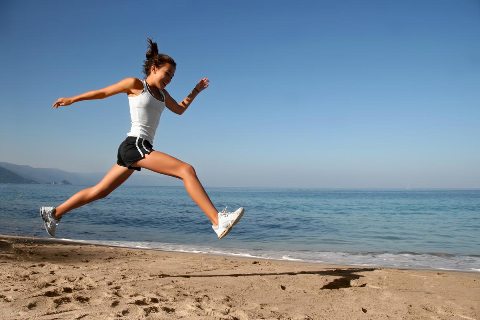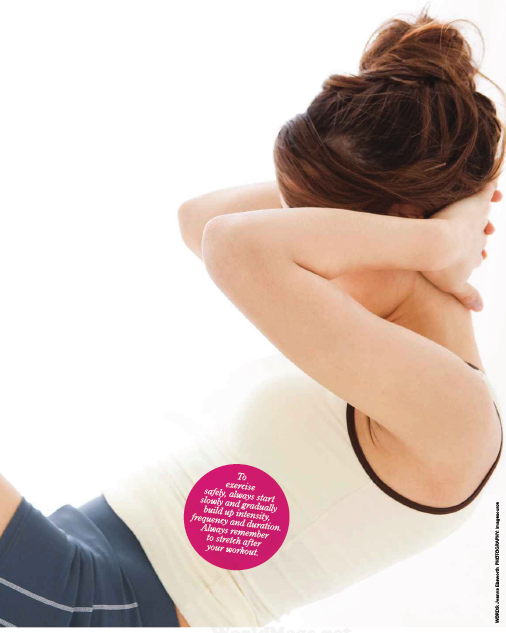Do you experience odd exercise-induced
niggles? We explain why some of the most common problems occur and how you can
get around them
Your exercise to feel good, but sometimes
your workout sessions can leave you feeling a little rough. Nausea, shakiness
or creaky joints after working out aren’t uncommon, but you don’t have to
endure these side-effects. We’ve asked the experts to reveal the physiology
behind six of the most common complaints, and what you can do to ease the symptoms.

No
More Workout Woes
Why does my back crack when I do
sit-ups?
It’s surprisingly common for backs to make
‘cracking’ noise during sit-ups. As long as you don’t have any pain, there’s no
reason to fear you have a back problem. However, full sit-ups aren’t very
back-friendly. ‘Sit-ups place too much load on the lower back, and emphasize
muscle imbalances in the trunk,’ says Chris Newman, senior physiotherapist at
Nuffield Health. ‘By training only one muscles group, you prevent the other
muscles in the back from providing balanced support to the spine.’ Swap sit-ups
for core exercises, such as planks, to work your whole body.
Why do I feel shaky after a workout?
You muscles need glucose for energy, and a
drop in blood sugar levels can lead to jitteriness. ‘Have a small, high-quality
carbohydrate snack an hour before working out, to regulate blood sugar and
prevent your body from drawing fuel from your sugar stores,’ says women’s
health specialist Dr. Marilyn Glenville. Vigorous exercise can place too much
stress on your body, causing the release of cortisol and adrenaline. This
stimulates your body further and can lead you to ‘crash’ into low blood sugar
more quickly, so Glenville suggests that you give calmer forms of exercise a
go.
Why do my feet tingle on cardio machine?
If you experience tingling or numbness in
your feet when you’re on the cross-trainer, bike or rowing machine, don’t
panic. ‘Your trainers are probably too tight, so buy shoes half a size too big
to allow your feet to expand,’ says PT Dan Roberts. ‘Tingling can also occur if
you keep your feet still for a long time, so wiggle them regularly and adjust
your foot position every couple of minutes.’ If you still get persistent
tingling, visit a podiatrist to rule out nerve damage or compartment syndrome,
both of which can usually be solved with orthotics and rest.
Why do my knees crunch during squats and
lunges?
It’s not unusual to hear crunching when you
do knee-related exercises. ‘Crunching, or crepitus, is the sound your knees
make when the joint surfaces move over each other and, as long as there’s no
associated pain, it doesn’t have any clinical significance,’ says Newman. ‘The
noise is created by a muscle imbalance in the knee, or tension on the outer
structures of the joint, such as your iliotibial band.’ If you do have pain,
see a physiotherapist. Alternatively, keeping your quadriceps and hip muscles
flexible can help reduce the sound.
Why does my skin itch during exercise?

To
exercise safely, always start slowly and gradually build up intensity,
frequency and duration. Always remember to stretch after your workout
Exercise can bring on allergic reactions,
such as anaphylaxis or urticarial, which arise when increased body temperature
and sweating causes the body to release histamines. Sufferers may develop
hives, and feel itchy and irritated by their clothing. ‘To lessen symptoms,
take antihistamines,’ says Glenville. ‘Or, for an effective, natural approach,
try a Quercetin supplement with anti oxidising bioflavonoids to help minimize reactions.’
Why do I ache on the second day after a
workout?
Exercising stresses your body, causing your
muscles to tear. As they adapt to these stresses and heal, you get stronger.
‘The most painful part of the healing process (DOMS or Delayed Onset Muscle
Soreness) occurs 24 to 48 hours after training, in the final stage before
muscles grow back stronger,’ says Roberts. Stretching and massage often relieve
symptoms, but DOMS tends to be less painful the more you train.